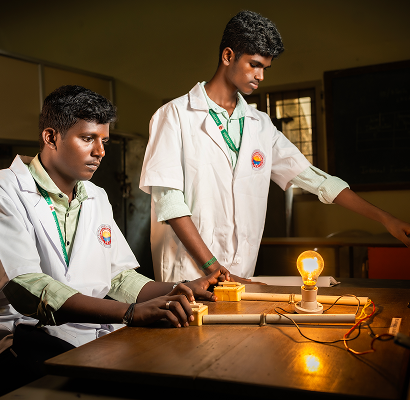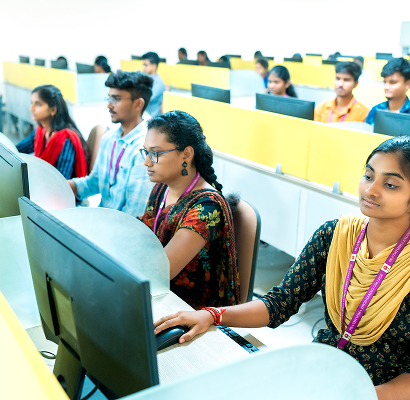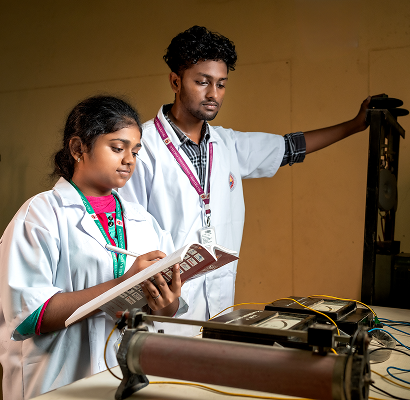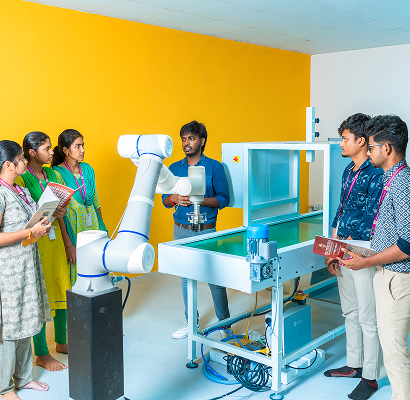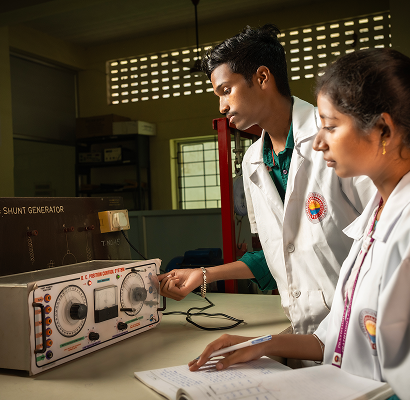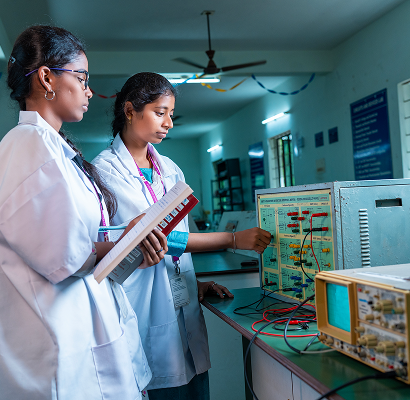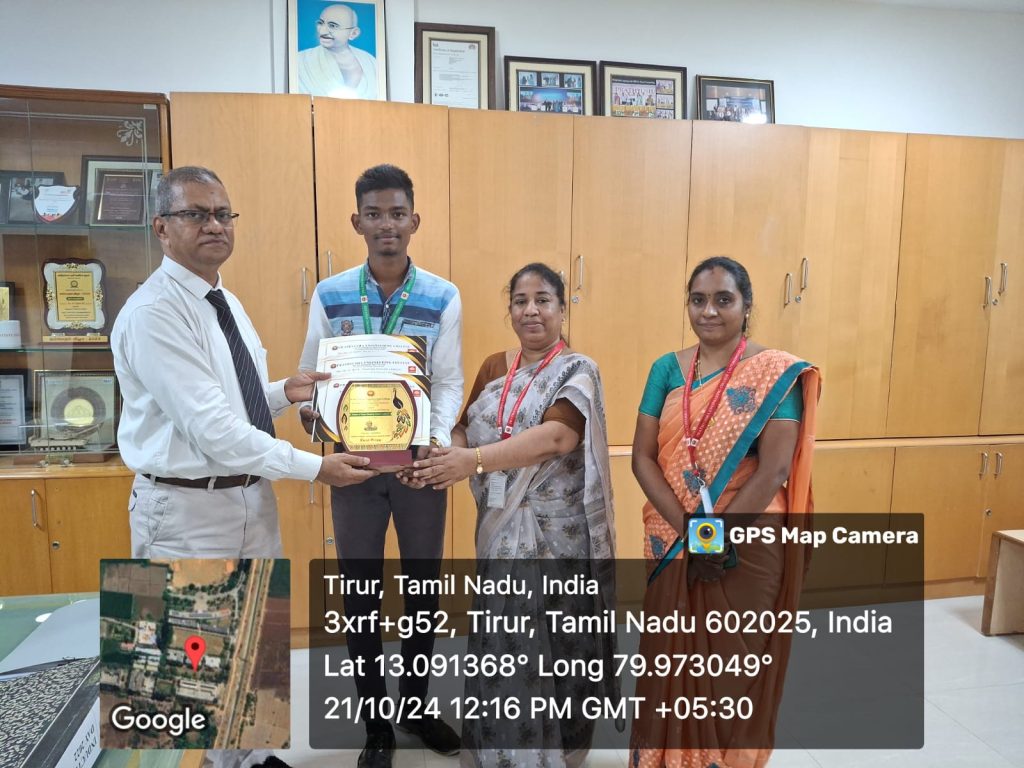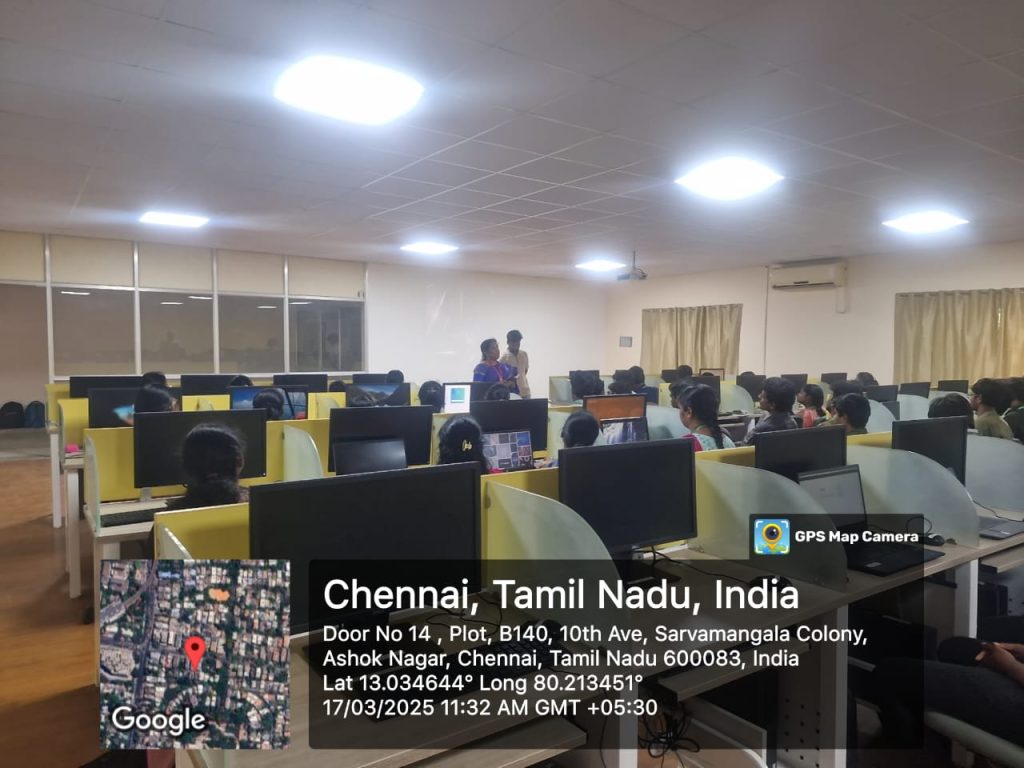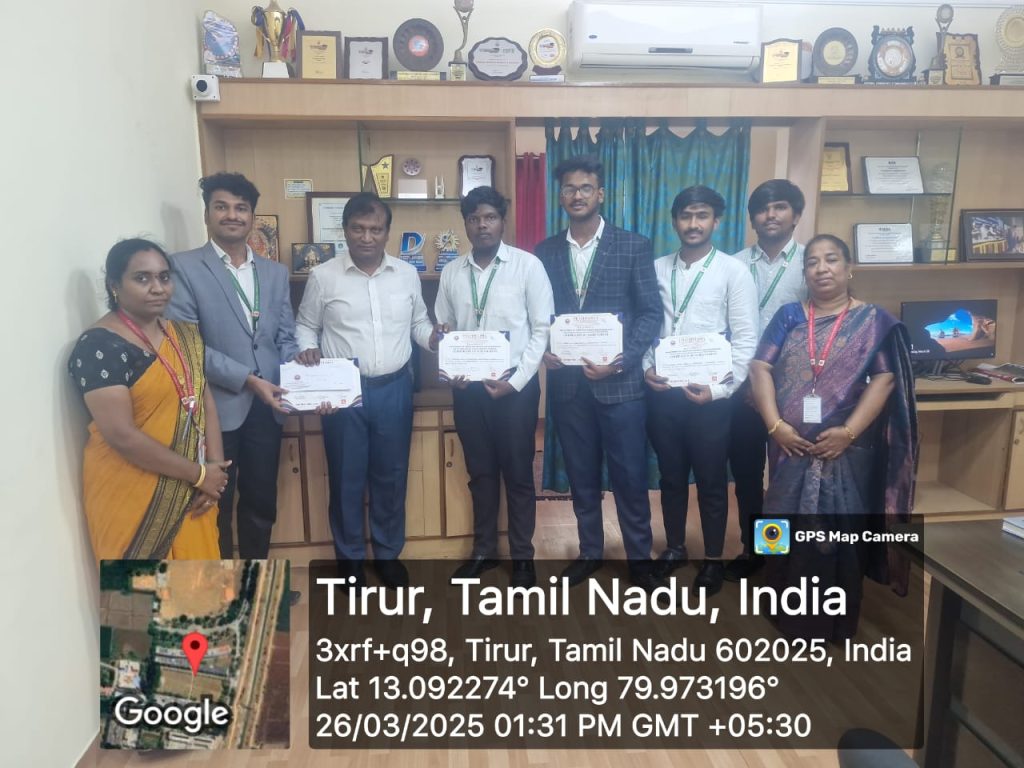- Result : 2023-24 Percentage : 67%
- Result : 2022-23 Percentage : 74%
- Result : 2021-22 Percentage : 80%
- Result : 2020-21 Percentage : 100%
- Result : 2019-20 Percentage : 72.22%
- Result : 2023-24 Percentage : 67%
- Result : 2022-23 Percentage : 74%
- Result : 2021-22 Percentage : 80%
- Result : 2020-21 Percentage : 100%
- Result : 2019-20 Percentage : 72.22%
About The Department
Founded in 2001, the Department of Electrical and Electronics Engineering (EEE) stands as a powerhouse of innovation and academic brilliance. Renowned for its unwavering commitment to excellence, the department offers a dynamic four-year Bachelor of Engineering (B.E.) program designed to shape the next generation of trailblazing engineers. Sanctioned by the prestigious All India Council for Technical Education (AICTE), this sought-after program admits 30 of the brightest minds each year, fostering a close-knit and intellectually stimulating environment.
The backbone of our department is a team of distinguished and visionary faculty members, whose passion for teaching and research drives our academic success. Among them are accomplished scholars with doctoral degrees and dedicated researchers actively engaged in pioneering projects. Their expertise spans an impressive array of cutting-edge domains, including renewable energy, power electronics, power system optimization, and power quality.
Our commitment to hands-on learning is reflected in our state-of-the-art laboratories, equipped with the latest technology and simulation software like MATLAB, PSCAD, and ETAP. These modern facilities empower students to gain practical skills while exploring real-world applications of engineering concepts.
We also take pride in hosting a wide range of seminars, guest lectures, student training programs, and Faculty Development Programs (FDPs), enriching the academic experience and keeping students abreast of the latest industry trends. To bridge the gap between academics and industry, we organize numerous industrial visits, exposing students to real-time practices and innovations.
Moreover, our department is equipped with a well-established Robotics Lab, where students receive comprehensive training to hone their skills in robotics and automation. Through hands-on sessions and expert guidance, our students become adept at tackling modern engineering challenges.
We take immense pride in our stellar placement record, with 100% of our students securing placements in top-tier companies through rigorous training and dedicated placement support. Our unwavering focus on industry readiness and skill enhancement ensures that every graduate steps confidently into the professional world.
Step into the EEE department—where innovation meets inspiration and ambition transforms into achievement. Join us to power your future with knowledge and ignite your potential as a leader in the ever-evolving world of electrical and electronics engineering.
Vision & Mission
Vision
- To promote and sustain the department of Electrical and Electronics Engineering as a leading beacon in the areas of Engineering education, scientific research, and development and to cater to the requirements of modern global engineering industries.
Mission
- To impart in depth knowledge in the various areas of Electrical and Electronics Engineering.
- To develop practical skills & hands-on experience in the field of Electrical and Electronics Engineering.
- To make competent engineers suitable for modern global engineering industries.
- To interact with various industries by signing MOU and thus create center of excellence.
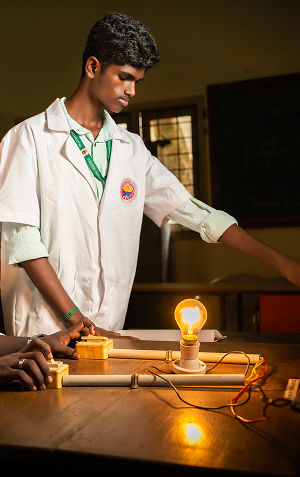
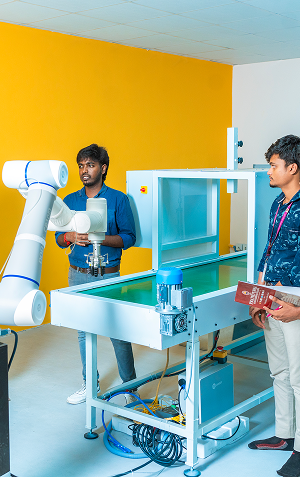
PO,PEO,POS
Programme Outcomes (POs)
- An ability to apply knowledge of computing, mathematics, science and engineering fundamentals appropriate to the discipline
- An ability to analyze a problem, and identify and formulate the computing requirements appropriate to its solution.
- An ability to design, implement, and evaluate a computer-based system, process, component, or program to meet desired needs with appropriate consideration for public health and safety, cultural, societal and environmental considerations.
- An ability to design and conduct experiments, as well as to analyze and interpret data.
- An ability to use current techniques, skills, and modern tools necessary for computing practice.
- An ability to analyze the local and global impact of computing on individuals, organizations, and society.
- Knowledge of contemporary issues.
- An understanding of professional, ethical, legal, security and social issues and responsibilities.
- An ability to function effectively individually and on teams, including diverse and multidisciplinary, to accomplish a common goal.
- An ability to communicate effectively with a range of audiences.
- Recognition of the need for and an ability to engage in continuing professional development.
- An understanding of engineering and management principles and apply these to one’s own work, as a member and leader in a team, to manage projects.
Programme Educational Objectives (PEOs)
PEO-1:To Enable the Graduates to excel in engineering positions in any organization that emphasize on design, development and implementation of complex electrical systems
PEO-2: To inculcate professional and multidisciplinary approach, entrepreneurial thinking and obtain skills necessary for interacting effectively with society.
PEO-3: To exhibit commitment to their profession by following the ethical and creative practices to serve the nation.
Programme Specific Objectives (PSO’s)
PSO1: Exploit consistent theoretical and practical methodologies to design and implementation in electrical system.
PSO2: Gain knowledge of basic Electrical and Electronics to Power Systems and Power Electronics for governing the system.
PSO3: Educate the computing platform and learn software for power systems and hybrid renewable energy system to meet out the demands.
Course Outcome
Regulations - 2021
Achievements

Mr. SD PARVEZ HUSSAIN
Our alumni student, Mr. SD PARVEZ HUSSAIN, designed a ROBOT to Assist Doctors to Help COVID-19 Patients. The machine is currently doing a tremendous job at Government Hospital, Nellore.

MS. S. Gayathri and K. Anilkumar
New StarFinal year students MS. S. Gayathri and K. Anilkumar won first and second prize respectively in the district level competition “Electrical Installation of India 2020” conducted by the Government of Tamilnadu.

Dr K. SATHYASEKAR (PROFESSOR/ EEE)
Outstanding Research Supervisor of the year award was presented to Dr K. SATHYASEKAR (PROFESSOR/ EEE) from UPACRI-2020 organised by DHS foundation in collaboration with Campbell University, USA

Mr.T.Prabhu
New StarSecond year student Mr.T.Prabhu won the events of Fast Catch and Accuracy in the Vallari competition, conducted by India’s 2nd National Boomerang [Vallari] Championship in 2021, Hosur.

A. Ibrahim Basha, S. Lokesh & T. Karthikeyan
New Star Final year EEE students A. Ibrahim Basha, S.Lokesh & T.Karthikeyan got fund of RS.7500 for their project title” SMART ELEPHANT MONITORING SYSTEM” from Tamil nadu State Council for Science & Technology. The project is guided by Ms.Shobana Associate Prof/EEE.

Advanced Solar Radiation
Advanced Solar Radiation Assessment centre has been established in association with Centre for Wind Energy and Technology, MNRE, India.
Your Pathway to Growth
Faculty
Dr.S.SHOBANA
Associate Professor/HOD
Dr.K.VENKATARAMANAN
Professor
Mr.J.RAJESH
Assistant Professor
Mr.P.KARTHIKEYAN
Assistant Professor
Dr.S.MANOJ
Assistant Professor
Academic Activities
Seminars & Expert Talks
Webinars & Online Sessions
Industrial Visits & Industry Exposure
No Data Available
No Data Available

